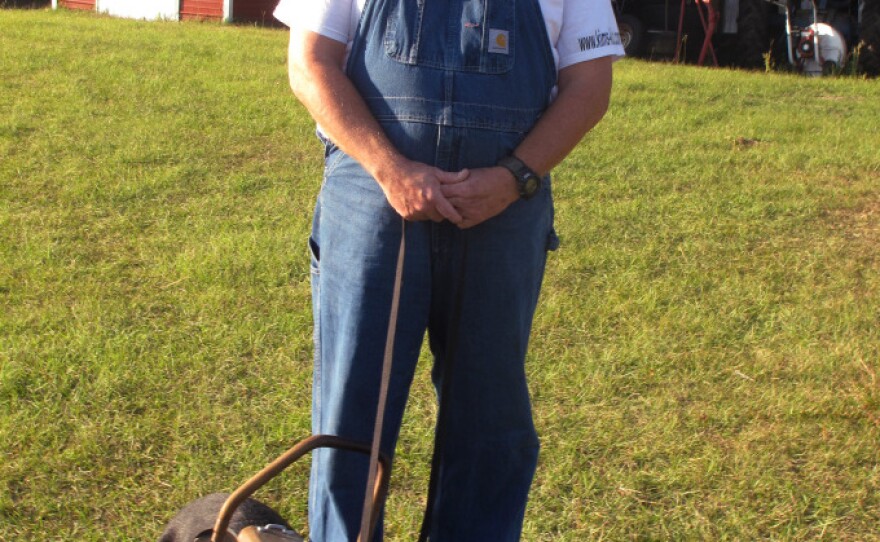Part of a monthlong series
The plan for Norris and Janis Galatas was that they would be settled and comfortable at middle age — paying off their bills and putting away something for the future. But now the wounded warrior and his wife are rethinking the American dream.
They live in the quiet countryside just outside Meridian, Miss., in what appears to be an ideal retirement spot. A wind chime swings in the breeze on the front porch of their gray-and-white cottage, which is nestled beside 10 acres of green horse pastures.
Willie, a portly black lab, barks when a visitor knocks on the front door. Willie sticks close by Norris, stocky himself, with a graying blond beard and denim overalls.

Norris Galatas with his black Labrador service dog, Willie. Willie has been with Galatas since the wounded soldier was discharged from Walter Reed Army Medical Center after four years of surgeries and rehab.
"Willie walks around with me," Galatas says. "I can lean on him."
A Career Cut Short
The dog keeps him from falling down, especially when he's up for a while, shopping at Walmart or making a trip to the VA hospital in Jackson.
Following in his father's footsteps, Galatas joined the Army National Guard when he was just 18, still in high school. He went from being a weekend warrior to a full-time officer with the Guard and Reserves. He had high hopes to retire with full benefits at age 57. But that plan changed when he drove over a roadside bomb in Iraq in 2005.
"The shrapnel came up through the bottom of the truck," he says, "and went through my right butt cheek and into my abdomen — and pretty much gutted me like a fish."
He spent the next four years in surgeries and rehab. Now, at age 49, he's struggling to make ends meet.
"I can't work. I'm just unfit for just about anything," Galatas says.
He says he's stuck with what he gets from Social Security disability and the Department of Veterans Affairs.
"That money makes it very difficult for us to do much more than just eat and pay the power bill," he says.
His retirement benefits amount to less than half of what his active duty salary was. He sometimes picks up aluminum cans and scrap metal to take to the salvage yard, but says that's no living.
"How fair is that?" he asks. "Just because I got hurt doing what you asked me to do, and I can't do it anymore, does that justify cutting my pay in half to where I can just barely survive?"
It's been even harder since his wife, Janis, lost her job after complications from a surgery last year. The couple's savings has run out, and Janis says some months they can't make the mortgage or other obligations. They care for her elderly mother and are helping pay down her sister's student loan that they co-signed 10 years ago. Her sister has lost her house to foreclosure.
'What Are We Going To Do?'
Their story is a familiar one — middle-aged Americans struggling to get by at the very time they expected to be securing their future. Janis is 58 years old and will be counting on Social Security in a few years. Now, she's afraid it won't be there.
"The Tea Partiers are saying, 'Let's just shut the government down,' " she says. "What happens to the Social Security checks and Norris' VA check that three families are depending on? What are we going to do?"
They live paycheck to paycheck, she says. "How can you say, 'Let's do away with Social Security and the entitlements'? Nothing we're getting are entitlements. I've paid in all my life, and Norris bled for his VA check."
The couple doesn't always see eye to eye when it comes to politics — he's more conservative and she's more liberal. But they do agree that the middle class has been left behind. Norris Galatas says no one in power is looking out for people like them.
"Politics and corporations have run our country into the ground," he says. "It's sad that the American dream is not even realistic anymore."
Still, Janis Galatas tries to stay upbeat, thankful that her soldier came home alive.
"Norris and I will make it," she says. "We're survivors."
She's written a book about her husband's ordeal, called A Soldier's Courage, and tries to share their experiences with other families caring for wounded warriors.
With no jobs and little income, the couple finds solace in their land and the horses they've been raising for 23 years. Every afternoon, Janis and Norris head out to the fields together. They have five quarter horses to tend to.
As the sun begins to set over the rural Mississippi countryside, they dole out oats and hay to hungry horses. They can't ride anymore, but find pleasure in watching them eat.
"To me that's just the happiest sound," Janis says. "This crunching, munching."
Copyright 2022 NPR. To see more, visit https://www.npr.org. 9(MDAzMjM2NDYzMDEyMzc1Njk5NjAxNzY3OQ001))







